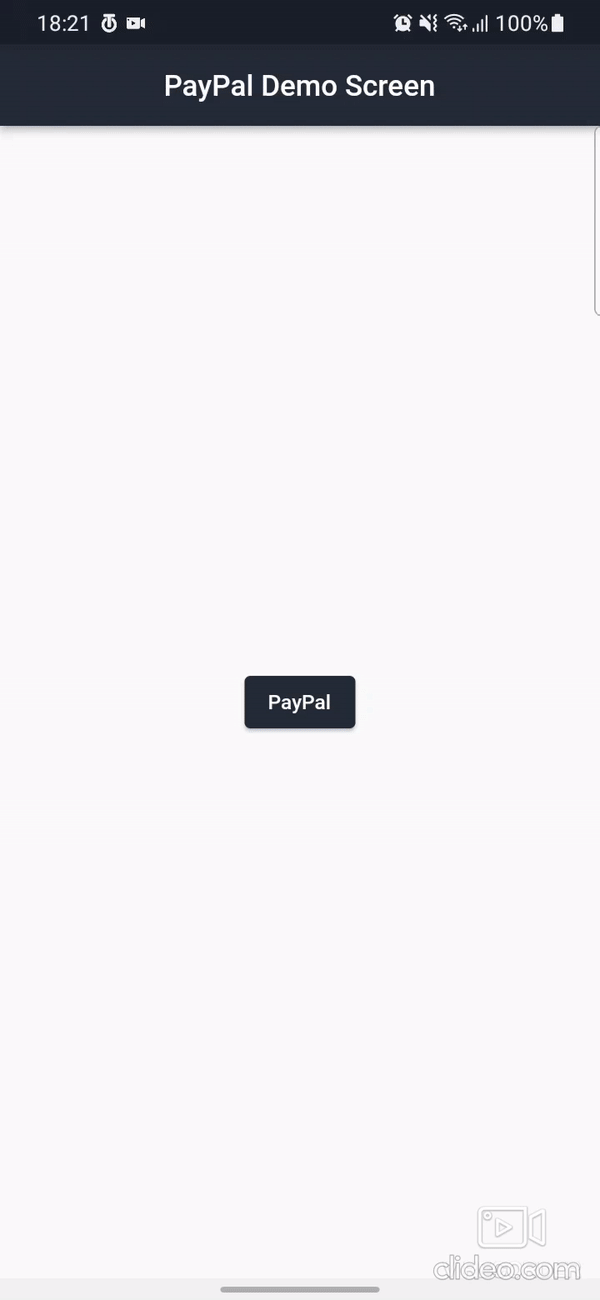Seamlessly integrate secure and efficient PayPal payments into your Flutter app with this easy-to-use package, leveraging the power of the latest PayPal APIs (v2) for a streamlined and professional payment experience
Features
- Utilizes the cutting-edge capabilities of PayPal APIs for enhanced security and functionality.
- Create orders effortlessly against your products, enhancing business flexibility and tracking capabilities.
- Seamlessly toggle between sandbox and live modes for thorough transaction testing in controlled and real-world environments.
- Enables developers to simulate and verify transactions in the sandbox mode before deploying to the live environment.
- Easy-to-integrate package designed for simplicity, ensuring a smooth setup process.
Getting started
After adding the package to your pubspec.yaml, make sure to import it
import 'package:paypal_webview/paypal_webview.dart';
You can checkout a simple illustration in the /example folder.
Usage
To seamlessly integrate PayPal payments into your application using this package, follow these straightforward steps in your code:
Initiate the integration process by creating an MDPurchaseItems model, which serves as a fundamental component for generating orders against the items you intend to sell.
class MDPurchaseItems {
String? name;
String? description;
String? quantity;
UnitAmount? unitAmount;
MDPurchaseItems(
{this.name, this.description, this.quantity, this.unitAmount});
Map<String, dynamic> toJson() {
final Map<String, dynamic> data = new Map<String, dynamic>();
data['name'] = this.name;
data['description'] = this.description;
data['quantity'] = this.quantity;
if (this.unitAmount != null) {
data['unit_amount'] = this.unitAmount!.toJson();
}
return data;
}
}
class UnitAmount {
String? currencyCode;
String? value;
UnitAmount({this.currencyCode, this.value});
Map<String, dynamic> toJson() {
final Map<String, dynamic> data = new Map<String, dynamic>();
data['currency_code'] = this.currencyCode;
data['value'] = this.value;
return data;
}
}
Next, establish the MDPayPal model to seamlessly obtain the payment ID upon successful transactions—a crucial step in streamlining the payment process.
class MDPayPal{
String? paymentId;
String? token;
String? payerID;
MDPayPal( String paymentId, String token, String payerID){
this.paymentId = paymentId;
this.token = token;
this.payerID = payerID;
}
}
Here's a concise and professional full implementation for seamlessly integrating PayPal payments into your application:
class HomePage extends StatefulWidget {
const HomePage({Key? key}) : super(key: key);
@override
_HomePageState createState() => _HomePageState();
}
class _HomePageState extends State<HomePage> {
/// Create list using MDPurchaseItems Model for generating order against your products
List<MDPurchaseItems> purchaseItems = [
MDPurchaseItems(
name: 'T-Shirt',
description: 'Green XL',
quantity: '1',
unitAmount: UnitAmount(currencyCode: 'CAD', value: '10')),
];
@override
Widget build(BuildContext context) {
return Scaffold(
appBar: AppBar(
backgroundColor: Color(0xff252C39),
title: Text('PayPal Demo Screen'),
centerTitle: true,
),
body: Center(
child: ElevatedButton(
onPressed: () {
Navigator.of(context)
.push(
MaterialPageRoute(
builder: (context) => PayPalWebView(
/// you will find the client Id after login to paypal developer account .
clientId: 'ATBV7KdKvDd9sGHYL4*******************************',
/// you will find the secret key after login to paypal developer account .
secretKey: 'EEitYKcFpiUCXplgxm*******************************',
currencyCode: 'CAD',
totalAmount: '10',
purchaseItems: purchaseItems,
/// sandboxMode true for testing purposes
sandbox: true,
),
),
)
.then((value) async {
if (value != null) {
/// After Successful Transaction you will receive MDPayPal Model type Data from which paymentId is use to verify payments
MDPayPal paypal = value;
print("The paypal Token is:" + paypal.token.toString());
print("the paypal payer id is:" + paypal.payerID.toString());
print("The paypal id is: " + paypal.paymentId.toString());
}
});
},
style: ElevatedButton.styleFrom(
primary: Color(0xff252C39), // Background color
),
child: Text('PayPal'),
),
),
);
}
}
With these simple code snippets, you can seamlessly integrate PayPal payments into your app, allowing for a smooth and secure transaction experience.
Example :

Additional information
Github : https://github.com/MussadaqAhmad